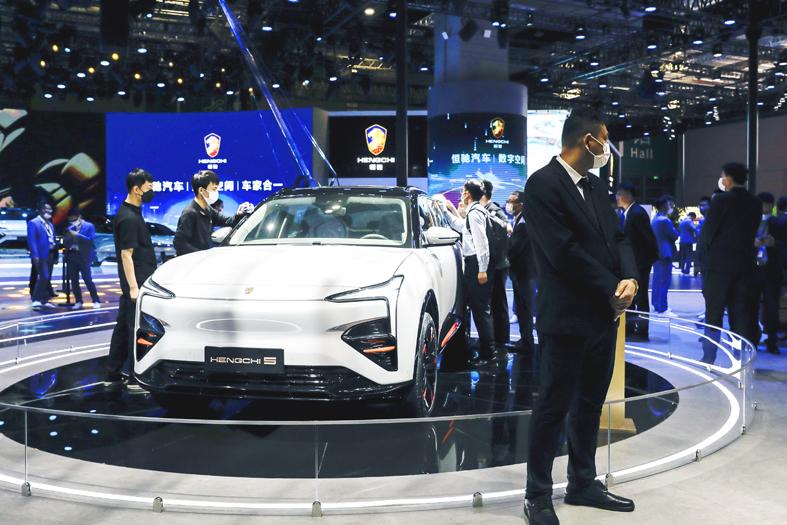China Evergrande Group’s financial woes have spilled over to Sweden, with a unit of the company’s electric vehicle (EV) arm in talks to find new backers after cutting 300 jobs.
“I’m acting as if things won’t be working out with Evergrande,” Stefan Tilk, the CEO of National Electric Vehicle Sweden AB, also known as NEVS, said in an interview. “Therefore we have entered discussions with new intended owners or project financiers.”
He declined to name them, citing non-disclosure agreements.

Photo: Bloomberg
Chinese property developer Evergrande is battling to stay afloat as it contends with more than US$300 billion in liabilities. The fallout has rippled through China’s economy and global financial markets, and its Hong Kong-listed EV arm is also facing a battle for survival.
Evergrande New Energy Vehicle Group Ltd (NEV) has missed salary payments to some employees, fallen behind on paying suppliers and even stopped free lunches for workers at its research center. As recently as April, it was valued at more than the Ford Motor Co, before a precipitous decline that wiped out almost US$83 billion in market cap.
NEVS in August gave termination notices to nearly half its 670 workers at the former Saab factory in Trollhattan. There is “no major activity” in the plant, Tilk said.
“The Evergrande situation triggered the decision,” he said. “These are things I had wanted to do for some time, but now it became necessary, given that Evergrande no longer can finance us.”
Tilk said his unit still has money to pay its workers. “I can’t give an exact date, but we can still manage,” he said. “We are talking beyond a few months.”
Evergrande NEV last week warned of a “serious shortage of funds,” making it likely to miss its delayed target of starting mass production next year. The closest the public has come to seeing the cars is the nine models it had on display at flashy exhibit at April’s Shanghai auto show.
As NEVS has a license to manufacture vehicles in China, and a factory in Tianjin, Tilk is resting his hopes on the company being able to play a key role in Evergrande’s ambition to bring a car to market.
“If there’s an asset they own outside of China that they care about, it’s NEVS,” Tilk said. “We are an essential piece of the puzzle for them to be able to manage their venture. The question mark is whether they have enough funds, stakeholders, if they’ll be able to invest further. I don’t know.”
NEVS was founded in 2012 and bought Saab’s assets out of bankruptcy, before running into financial difficulties of its own. It put production of its Saab 9-3 on hold in 2014 before entering into debt reorganization that lasted almost a year.
Evergrande first invested in the company in early 2019 through its EV arm, before lifting its stake later that year.
The deal was part of an acquisition spree by Evergrande founder Xu Jiayin (許家印) as he embarked on an ambitious push to overtake Elon Musk’s Tesla Inc. as the world’s biggest EV maker — a goal that is looking increasingly unreachable as he struggles to rescue his debt-laden empire.

Taiwan Semiconductor Manufacturing Co (TSMC, 台積電) would not produce its most advanced technologies in the US next year, Minister of Economic Affairs J.W. Kuo (郭智輝) said yesterday. Kuo made the comment during an appearance at the legislature, hours after the chipmaker announced that it would invest an additional US$100 billion to expand its manufacturing operations in the US. Asked by Taiwan People’s Party Legislator-at-large Chang Chi-kai (張啟楷) if TSMC would allow its most advanced technologies, the yet-to-be-released 2-nanometer and 1.6-nanometer processes, to go to the US in the near term, Kuo denied it. TSMC recently opened its first US factory, which produces 4-nanometer

GREAT SUCCESS: Republican Senator Todd Young expressed surprise at Trump’s comments and said he expects the administration to keep the program running US lawmakers who helped secure billions of dollars in subsidies for domestic semiconductor manufacturing rejected US President Donald Trump’s call to revoke the 2022 CHIPS and Science Act, signaling that any repeal effort in the US Congress would fall short. US Senate Minority Leader Chuck Schumer, who negotiated the law, on Wednesday said that Trump’s demand would fail, while a top Republican proponent, US Senator Todd Young, expressed surprise at the president’s comments and said he expects the administration to keep the program running. The CHIPS Act is “essential for America leading the world in tech, leading the world in AI [artificial

REACTIONS: While most analysts were positive about TSMC’s investment, one said the US expansion could disrupt the company’s supply-demand balance Taiwan Semiconductor Manufacturing Co’s (TSMC, 台積電) new US$100 billion investment in the US would exert a positive effect on the chipmaker’s revenue in the medium term on the back of booming artificial intelligence (AI) chip demand from US chip designers, an International Data Corp (IDC) analyst said yesterday. “This is good for TSMC in terms of business expansion, as its major clients for advanced chips are US chip designers,” IDC senior semiconductor research manager Galen Zeng (曾冠瑋) said by telephone yesterday. “Besides, those US companies all consider supply chain resilience a business imperative,” Zeng said. That meant local supply would

BIG INVESTMENT: Hon Hai is building the world’s largest assembly plant for servers based on Nvidia Corp’s state-of-the-art AI chips, Jalisco Governor Pablo Lemus said The construction of Hon Hai Precision Industry Co’s (鴻海精密) massive artificial intelligence (AI) server plant near Guadalajara, Mexico, would be completed in a year despite the threat of new tariffs from US President Donald Trump, Jalisco Governor Pablo Lemus said. Hon Hai, also known as Foxconn Technology Group (富士康科技集團), is investing about US$900 million in what would become the world’s largest assembly plant for servers based on Nvidia Corp’s state-of-the-art GB200 AI chips, Lemus said. The project consists of two phases: the expansion of an existing Hon Hai facility in the municipality of El Salto, and the construction of a